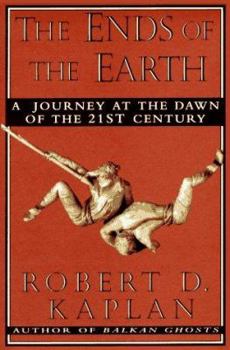The Ends of the Earth: A Journey at the Dawn of the Twenty-First Century
Select Format
Select Condition 
Book Overview
Author of Balkan Ghosts , Robert D. Kaplan now travels from West Africa to Southeast Asia to report on a world of disintegrating nation-states, warring nationalities, metastasizing populations, and... This description may be from another edition of this product.
Format:Hardcover
Language:English
ISBN:0679431489
ISBN13:9780679431480
Release Date:February 1996
Publisher:Random House (NY)
Length:476 Pages
Weight:1.95 lbs.
Dimensions:1.6" x 6.5" x 9.5"
Customer Reviews
5 ratings
Mandatory reading!
Published by Thriftbooks.com User , 21 years ago
Robert Kaplan writes in a style that drives the reader's eyes to rip the words from the page. This book was not only extremely relevant to current events(strange that it was written several years ago), it gives the reader a real view of life in a part of the world which almost any westerner would not survive two seconds in. Read this and open your frickin eyes to the shaky world we are living in.
now I'm hooked.
Published by Thriftbooks.com User , 21 years ago
I read this on my flight to Turkey, as I experienced my first entry into a truly foreign country. Although I didn't take the risk of travelling outside of the "bubble" that Kaplan talks about, sections of this book definitely pertained to my trip. It altered the way I perceived the world around me. Instead of seeing some Istanbul neighborhoods as helplessly impoverished, I looked for signs of the middle-class ambition that Kaplan spoke of. I also realized that my standards of living are not available to most of the world, and The Ends of the Earth was a good introduction to this concept.I find particularly interesting the political context in Kaplan's travel writing. Not only do you get the direct visceral experience of travelling through so-called "third world" countries, but you get the political history. My friend said that the book itself is a journey through thought as it is a journey through countries. There is no final answer to why certain cultures develop in one way and others develop in other ways - but you'll certainly appreciate the process as Kaplan visits developing nations across the world and attempts to analyze the past's impact on the present.This book is highly readable. You simply do not get bored, and I can't think of another non-fiction book that I didn't want to put down at some point.
The possible fracture lines
Published by Thriftbooks.com User , 23 years ago
I give this book five stars for one reason: it is important to read it and to keep thinking about its main subject: the future of the nation-state and the possible consequences of its demise. Kaplan knows he is going to be subjective. That's fine. He is well-read and travels with a good piece of luggage: previous knowledge of the history of the places he's going to -unlike most of the backpackers he correctly mocks at-. Kaplan is a good writer. He goes to fascinating and really different places. But the important thing about the book is his reflections on the future of the world, from the standpoint of these societies. This book takes us to some of the places where the future of humanity will be decided, within the next decades. These are regions in crisis, in its clinical, primary meaning: artificial borders, paper-States, overpopulation, an exhaustion of natural resources, forced and vertiginous urbanization, and one more thing: the rapid increase in violent religious fanatism, as a consequence of the erosion of identity in the misery-ridden slums of the Third World. The rank-and-file of the fundamentalist threats is formed by poor peasants who suddenly had lo leave their land and become lumpen-proletariats in Cairo, Ankara or some other megalopolis. West Africa, Egypt, Turkey, Iran, Central Asia, the Indian subcontinent, and Southeastern Asia, are "fracture lines". These regions are living the beginning of the end of the Nation-state as the basic cell of human political organization, only in the other end of the spectrum, compared with the European Union. And yet there is hope. As in Rishi Valley, what we still call the Third World need not be lost for peace, prosperity and a promising future. At least, not all of it. For that outcome to happen, the West has to turn its eyes and minds to help. Clearly, the West can not do what these peoples themselves are not willing to do. But the West must help when it is possible. The elites of these nations must come to terms with their responsibilities in leading their peoples out of the bleak way in which some of them are embarked. It is possible, but first we have to know the problems. And Kaplan is helping with his books.
Admiration in despite of "malthusian" pessimism
Published by Thriftbooks.com User , 26 years ago
I want to express my deeper admiration to this work, that I consider extremely clarifying on the situation of the Third World. Perhaps the theory will be excessively "malthusian" and, as such, pessimistic, but when procures be released of that prophetic determinism, Kaplan provides explanations that can not be rejected beforehand . Joaquín Collado (Spain)
A travel guide in the tradition of Dante!
Published by Thriftbooks.com User , 27 years ago
Kaplan leads us along civilizations' San Andreas fault. Here are the places where upheavals, fissures, explosions and social destruction are likley to occur. Kaplan is a travel writer in the same way that Dr. Stranglove is a physics teacher. He sets out to write a travel document that serves as "shock therapy" and succeeds admirably. His analysis of the ethnic stew that is Central Asia is helful to the general reader who wants to understand the political implications of the break-up of the Soviet Union




